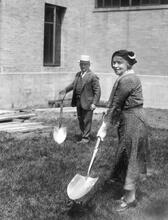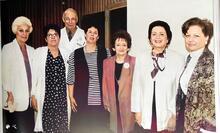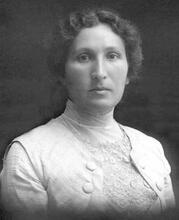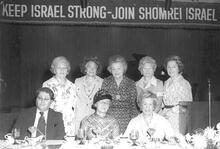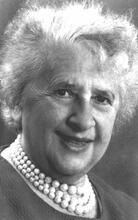S. Deborah Ebin
The daughter of Mizrachi movement leader Rabbi Aaron M. Ashinsky, S. Deborah Ebin helped the group American Mizrachi Women rescue a staggering number of children from Europe during and after World War II. Ebin cofounded the Cleveland chapter of Hadassah at the turn of the century and represented the women’s Zionist movement at the World Zionist Congress. In 1943, she became chair of the American Mizrachi Women’s National Youth Aliyah, running the largest relocation of Jewish children to Israel and helping these war refugees resettle in youth villages geared to their needs. Ebin served as national president of American Mizrachi Women from 1954 to 1956 and presented the organization’s America-Israel Friendship Award to President Harry S. Truman in 1955.
S. Deborah Ebin was a national community and Zionist leader who devoted her life to the advancement of Jewish education and Zionist ideals. A dynamic orator, fund-raiser, and world traveler, she was fluent in several languages and versed in the Lit. "teaching," "study," or "learning." A compilation of the commentary and discussions of the amora'im on the Mishnah. When not specified, "Talmud" refers to the Babylonian Talmud.Talmud, making her a formidable figure in American Jewish life.
Early Life and Zionism
She was born in 1888 in Syracuse, New York, to Polish-born rabbi Aaron M. and Pearl (Drob) Ashinsky. Rabbi Ashinsky was a founder of the Mizrachi movement in the United States and Canada. She was the eldest of five daughters and two sons. She spent her early years in Detroit, Michigan, and Montreal, Canada, where her education included the study of French and Latin. At the turn of the century, the family settled in Pittsburgh, where she attended Madam De Wolfe’s Academy and was privately tutored in Hebrew and Talmudic studies—not a common practice for Jewish women at the time. In later years, Ebin’s memorable speeches often included Talmudic references.
In 1907, she married the Russian-born rabbi Nachman Ebin. The young couple lived in Scranton, Pennsylvania, and Cleveland, where Deborah Ebin cofounded the Cleveland chapter of Hadassah with Henrietta Szold. The Ebins also lived in Buffalo and eventually settled permanently in Brooklyn. They had one daughter, Freda, and two sons, David and Judah.
Rabbi Ebin was a prominent rabbinic and Zionist leader involved in Jewish education and Zionist causes. After his death in 1943, Deborah Ebin was approached by Rabbi Meir (Berlin) Bar Ilan (1880–1949, after whom Bar Ilan University was named) to become involved with the women’s Mizrachi movement in the United States. Ebin agreed to follow in her father’s footsteps, becoming the chair of a child restoration project sponsored by American Mizrachi Women (later known as AMIT). The project was aimed at helping European Jewish children to immigrate to Israel during and following World War II. Ebin coined the phrase “child restoration” to describe the physical and spiritual rehabilitation of young refugees from Hitler’s Europe. She worked closely with Kfar Batya, a children’s village founded by Bessie Gotsfeld in Ra’anannah, Israel, and universally recognized for its work with Jewish youths.
Postwar Advocacy
In 1943 Ebin became American Mizrachi Women’s chair of National Youth Lit. "ascent." A "calling up" to the Torah during its reading in the synagogue.Aliyah, the agency responsible for the largest mass migration of Jewish children during and after World War II. Ebin embarked on an extensive schedule of speaking engagements and activities throughout the United States and other countries. She visited Israel and Europe, including child detention centers in Cyprus. She also organized Mizrachi Women chapters in the Netherlands and Mexico.
Ebin represented the women’s Zionist movement at many international meetings, including the World Zionist Congress and the World Youth Aliyah Conferences of 1939 and 1951. As national president of American Mizrachi Women from 1954 to 1956, she met with U.S. Government leaders, including President Harry S. Truman, to whom she presented the organization’s America-Israel Friendship Award in Kansas City in 1955.
She remained active in Jewish causes until her death on September 23, 1974, in New York City.
AYJB 76:513.
Chaleff, Joanne, and Dina Dyckman, and Herzl Eisenstadt, and Ruth Jacobson. Conversations with author, September 1996.
Golub, Mollie F. “AMW Expands to Meet the Ingathering of the Exiles.” American Mizrachi Woman (September–October 1975).
Swiss, Irwin A., and H. Norman Shoop. Rabbi Aaron M. Ashinsky: Fifty Years Study and Service (1935).
NYTimes, May 28, 1943.
Obituary. NYTimes, September 25, 1974, 42:4, WWIAJ.

